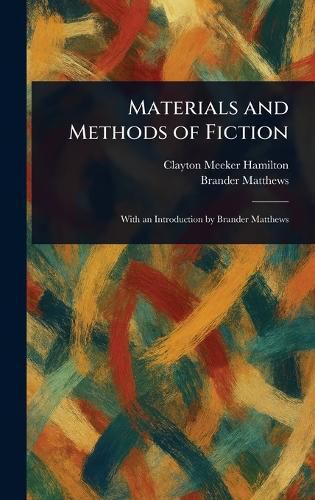Readings Newsletter
Become a Readings Member to make your shopping experience even easier.
Sign in or sign up for free!
You’re not far away from qualifying for FREE standard shipping within Australia
You’ve qualified for FREE standard shipping within Australia
The cart is loading…






This title is printed to order. This book may have been self-published. If so, we cannot guarantee the quality of the content. In the main most books will have gone through the editing process however some may not. We therefore suggest that you be aware of this before ordering this book. If in doubt check either the author or publisher’s details as we are unable to accept any returns unless they are faulty. Please contact us if you have any questions.
"Materials and Methods of Fiction," by Clayton Hamilton, offers a deep dive into the art of crafting compelling narratives. With an introduction by Brander Matthews, this book meticulously examines the core elements of fiction writing. Explore timeless principles of literary technique, unraveling the secrets of narrative structure and effective plot development.
Hamilton provides insightful analysis on character development, offering guidance applicable to various forms of fiction. This comprehensive guide explores the building blocks of storytelling, making it a valuable resource for understanding the craft. Delve into the fundamental "Materials and Methods of Fiction" to appreciate the enduring power and construction of captivating stories. A classic exploration of fiction, republished for its continued relevance to writers and readers alike.
This work has been selected by scholars as being culturally important, and is part of the knowledge base of civilization as we know it.
This work is in the public domain in the United States of America, and possibly other nations. Within the United States, you may freely copy and distribute this work, as no entity (individual or corporate) has a copyright on the body of the work.
Scholars believe, and we concur, that this work is important enough to be preserved, reproduced, and made generally available to the public. We appreciate your support of the preservation process, and thank you for being an important part of keeping this knowledge alive and relevant.
$9.00 standard shipping within Australia
FREE standard shipping within Australia for orders over $100.00
Express & International shipping calculated at checkout
Stock availability can be subject to change without notice. We recommend calling the shop or contacting our online team to check availability of low stock items. Please see our Shopping Online page for more details.
This title is printed to order. This book may have been self-published. If so, we cannot guarantee the quality of the content. In the main most books will have gone through the editing process however some may not. We therefore suggest that you be aware of this before ordering this book. If in doubt check either the author or publisher’s details as we are unable to accept any returns unless they are faulty. Please contact us if you have any questions.
"Materials and Methods of Fiction," by Clayton Hamilton, offers a deep dive into the art of crafting compelling narratives. With an introduction by Brander Matthews, this book meticulously examines the core elements of fiction writing. Explore timeless principles of literary technique, unraveling the secrets of narrative structure and effective plot development.
Hamilton provides insightful analysis on character development, offering guidance applicable to various forms of fiction. This comprehensive guide explores the building blocks of storytelling, making it a valuable resource for understanding the craft. Delve into the fundamental "Materials and Methods of Fiction" to appreciate the enduring power and construction of captivating stories. A classic exploration of fiction, republished for its continued relevance to writers and readers alike.
This work has been selected by scholars as being culturally important, and is part of the knowledge base of civilization as we know it.
This work is in the public domain in the United States of America, and possibly other nations. Within the United States, you may freely copy and distribute this work, as no entity (individual or corporate) has a copyright on the body of the work.
Scholars believe, and we concur, that this work is important enough to be preserved, reproduced, and made generally available to the public. We appreciate your support of the preservation process, and thank you for being an important part of keeping this knowledge alive and relevant.